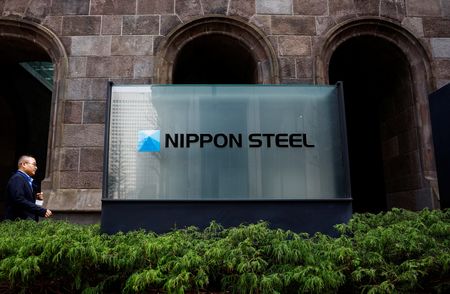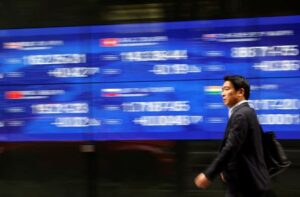By Jeff Mason, David Shepardson and Alexandra Alper
WASHINGTON (Reuters) -The White House is close to announcing President Joe Biden will block Nippon Steel’s acquisition of U.S. Steel citing national security concerns, two sources familiar with the situation said on Wednesday, amid growing bipartisan political opposition to the $14.9 billion deal.
U.S. Steel had earlier warned on Wednesday that a failure to conclude a deal with Japanese-based Nippon would put thousands of U.S. union jobs at risk and signaled that it would close some steel mills and potentially move its headquarters out of the politically important state of Pennsylvania.
A decision could be announced as soon as later this week, sources told Reuters. The move could potentially impact the United States’ relationship with Japan, a close ally.
The Washington Post first reported the plan. Shares of U.S. Steel closed down 17.5%. Nippon declined comment and U.S. Steel did not immediately comment on the administration’s plans.
Nippon’s planned acquisition of the U.S. steelmaker faces opposition from Democrats and Republicans, with Vice President Kamala Harris on Monday saying she wants U.S. Steel to remain “American owned and operated.” Her Republican rival Donald Trump has pledged to block the deal if elected.
Pennsylvania is a crucial battleground state that could sway the outcome of the 2024 presidential election and both candidates are making repeated visits there.
The panel that is reviewing the proposed merger for national security reasons has not sent its formal recommendation to the president, the White House said. White House spokesman John Kirby declined to comment on Biden’s plans, but reiterated the president’s view “that American steel companies ought to be American owned.”
The Treasury Department, which is overseeing the national security approval process for the deal, declined to comment.
U.S. Steel employees rallied on Wednesday outside the company’s headquarters seeking to convince politicians to reconsider their opposition to the proposed transaction.
“We want elected leaders and other key decision makers to recognize the benefits of the deal as well as the unavoidable consequences if the deal fails,” U.S. Steel CEO David Burritt said in a statement.
He said that without the deal, “U.S. Steel will largely pivot away from its blast furnace facilities, putting thousands of good-paying union jobs at risk (and) negatively impacting numerous communities across the locations where its facilities exist.”
He added that the failure of the deal would raise “serious questions about U.S. Steel remaining headquartered in Pittsburgh.” He told the Wall Street Journal it would likely move its headquarters to the south if the deal collapsed.
The United Steelworkers union criticized Burritt, accusing him of “making baseless and unlawful threats.”
“Today’s pathetic attempt to orchestrate a rally in downtown Pittsburgh shows that U.S. Steel is becoming increasingly desperate to save the deal,” the union said.
The Trump campaign did not immediately respond to a request for comment on the U.S. Steel comments. The Harris campaign declined to comment as well.
Nippon Steel said last week that it plans to invest over $2.7 billion in union-represented facilities at Mon Valley Works in Pennsylvania and Gary Works in Indiana in support of the future of manufacturing for those communities.
U.S. Steel said that if the deal does not get approved it “would not make the same financial commitments.” The steelmaker has cut jobs in recent years including in Michigan.
Nippon said earlier on Wednesday that the core senior management as well as a majority of board members at the U.S. company would be U.S. citizens if the deal goes ahead.
Nippon’s planned $14.9 billion acquisition has received all regulatory approvals from outside the United States and a green light from U.S. Steel’s shareholders. It is now under regulatory review in the United States.
(Reporting by David Shepardson in Washington and Aatreyee Dasgupta in Bengaluru; Editing by Krishna Chandra Eluri, Mark Porter, Deepa Babington and Anna Driver)





